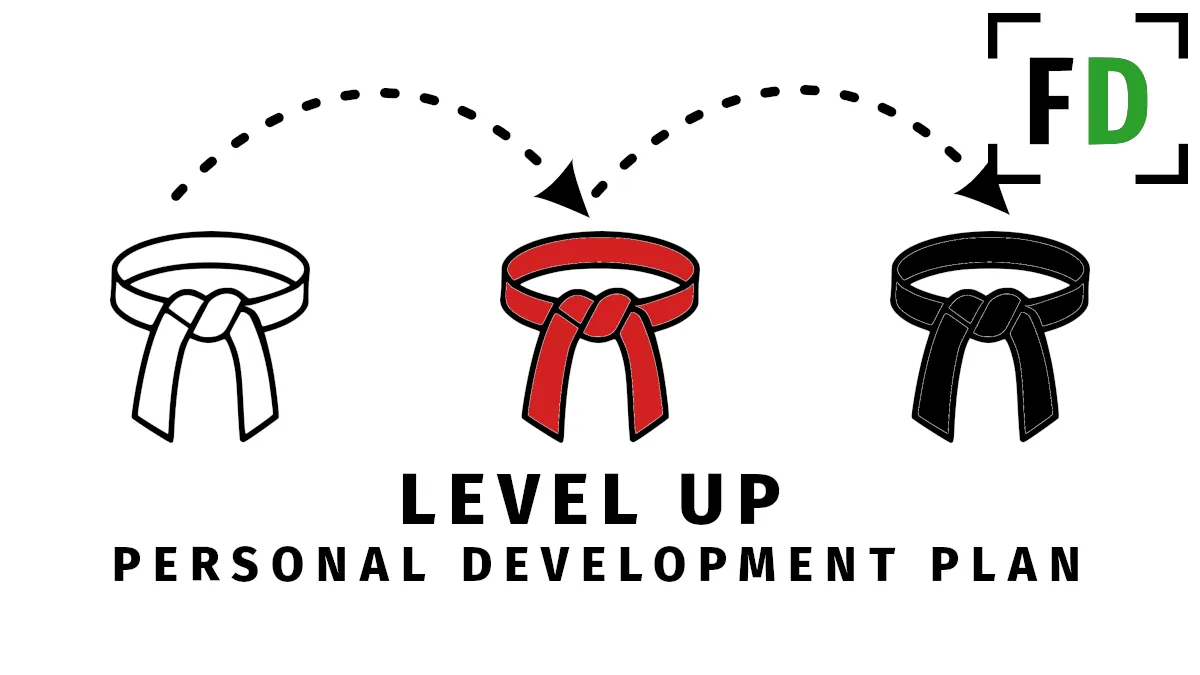Everything we do here at Face Dragons either builds self-discipline or requires it to succeed. It’s a superpower you can call on whenever you need it. Without a disciplined mind, you won’t achieve your goals or get the life you want. But self-discipline isn’t a switch you can just turn on; it’s a skill that takes time to develop. Follow the steps in this guide, and you’ll grow in mental fortitude and see your life change for the better.
Table of Contents
- What Is Self Discipline?
- What Will Self-Discipline Do For Your Life?
- How to Build Self Discipline
- Self-Discipline Books that Will Craft You
- Tips for Becoming a Disciplined Person
What Is Self Discipline?
Self-discipline is deciding to do something, then following through and doing it. It’s that simple. But, like most things, people overcomplicate it, so let’s dig a little deeper and try to differentiate self-disciple from other ideas such as willpower, fortitude, and mental toughness.
Willpower is something everyone has.
In Willpower: Rediscovering the Greatest Human Strength, Roy F. Baumeister explains mankind’s limited pool of willpower. Once it’s depleted for the day, resisting staying up late, eating garbage, or any bad habit becomes almost impossible.
With only a limited amount, if you rely on willpower to achieve your dreams, you’ll never get where you want to be, and every day (if you’re working hard), your bad habits will get the better of you at the end of the day.
Willpower is super helpful, especially when something unexpected comes up or when you have to do something you hate, but you need something more if you want to be consistent and last throughout the day.
Fortitude is something we should all try to develop.
Fortitude is one of the four cardinal virtues. Plato identified them in The Republic, and other philosophers, such as Aristotle, Cicero, and Marcus Aurelius, subscribed to the virtues too. Eventually, they arrived in modernity via the Church, which describes fortitude in this way:
“Fortitude is the moral virtue that ensures firmness in difficulties and constancy in the pursuit of the good.”
So fortitude is always pursuing the good without budging when times get tough.
Mental toughness is self-control over one’s mentality.
While fortitude is firmness in the face of external difficulties, mental toughness is firmness in the face of internal ones.
The world can be encouraging you, supporting your work, and motivating you to continue, but mental health issues can still stop you in your tracks. Mental toughness, then, is the ability to stay the course and maintain your mindset while not being influenced by negative emotions.
Self-discipline implies more than having a strong will or mental fortitude because the root of the word is the same as that of a disciple – discipulus, which means student.
Having discipline, then, is more than blind willpower and isn’t only about pursuing goodness or gratification; it’s about a learned kind of mental willpower that studies, considers, decides the best choice, and builds smart systems to make those choices inevitable.
What Will Self-Discipline Do For Your Life?
Look at your list of life goals, the most important things to you, (I’m going to assume you have a list, right?) How many of those goals just require luck, Like winning the lottery? And how many are you sure to achieve if you work hard enough?
I’ve talked to hundreds of clients about their goals, and they are almost always of the second type – 100% achievable if only they work consistently at them.
Goals like:
- Learn a language
- Build a Business
- Get a social media following
- Get in Shape
- Buy a House
- Move to Another Country
You could have them all if you want, and the only thing you need to accomplish them is self-discipline.
Everyone has tried taking on a big goal only to quit or start procrastinating after the initial excitement and motivation wore off. Imagine if you had followed through ten years ago when you thought about starting your business, you’d have your own successful company by now, or when you thought about getting ripped three years ago, how good would you look and feel if you had just stuck at it?
Self-discipline isn’t complicated to build, it won’t come easy, but it will be worth it.
How to Build Self Discipline
Here is a simple roadmap to take you from wherever you are right now to a pillar of self-disciplined purpose and action. It requires five simple steps.
- Focus on the right things first.
- Do it every day effortlessly.
- Have a plan for days when you don’t want to
- Have a plan for days when you fail
At first, forcing yourself to do things that don’t come naturally will be tough, but with this plan, you can build up your discipline gradually, making it seem easier but still getting great results.
Know What You Want
There’s no point in being a highly disciplined machine if all you do all day is speedrun Mario Bros. Sure, it takes disciple to get a speedrun record, but is that really what you want to focus the precious hours of your life on?
If you don’t, you must decide what to focus on.
Without a goal or ongoing project, there’s nothing to practice your self-discipline on. Similarly, if all you have is a short-term project, what will you do when it ends?
So write down some life goals and a project or two that will last, perhaps till the end of your life, but at least for the foreseeable future.
Here are some examples:
- Your Health & Fitness
- A Hobby (like a martial art)
- Your Education
- A Business or Side Hustle
You can create a short list of goals, but building a complete system around what you want to get done will be more helpful in the long run. That’s why, even after 20 years, reading Getting Things Done or Making It All Work (which I prefer) is a must for anyone wanting to get the most out of their life. It will help you build a system not only to help you get things done but also to get the right things done.
Now you have something to work on, let’s build some discipline.
Do It Everyday
Remember what self-discipline means, “Deciding to do somehting, then following through and doing it.”
To strengthen your discipline muscle, you must work at it every day. If you aim to build a successful business, working on it twice a week won’t turn it into a reality, and you won’t gain much self-discipline either. So you need to work at it every day.
At first, you’ll feel like you need days off and get frustrated, but pretty soon, working at your goal every day will become your new normal. At that point, you can tell you’ve grown in discipline.
How do you make yourself do something every day, even when you’re tired or feeling weak?
You must vary your workload.
You can’t (especially at first) force yourself to work all day long like a machine.
- Start with an easily manageable workload – this is an amount that you can do every day with no problems or fatigue.
- Increase the workload over the first few weeks until it becomes challenging.
- Maintain your workload for a week and reduce it if you feel less productive each day (that’s an early warning for burnout)
- When you find your optimum workload (where you get as much done as possible and still recover fully the next day), maintain it.
- Occasionally push yourself to do more work, then go back to your maintenance level.
- When the “push days” feel easier, it’s time to increase your maintenance level.
Here’s a clear example a writer might use:
- Day 1: Manageable Workload – 200 words per day
- First Two Weeks: Increase workload – After two weeks, I’m writing 1200 words per day
- Week 3: Find Your Maintenace Level – I reduce to 1000 after starting to burn out
- Week 3-6: Maintain Optimum Workload – 1000 words per day for three weeks
- Week 6-9: Add Push Days – Every Saturday, I write 200 words
Set an Achievable Minimum
Everyone wants to achieve big goals. Influencers and successful people you admire tell you to do more, push harder, and 10X your goals. But you can only do those things after developing the self-discipline you need.
The first rule of building discipline is:
“Doing something small is better than doing nothing.”
Let this be your mantra.
On those days when you usually just give up on your to-do list, lie on the couch after work and do nothing, you aren’t going to work for 4 hours on your big project; it just won’t happen. But maybe there is something you could manage.
Let’s take two examples that represent the type of work you need to do to accomplish your goals.
- Repetitive or creative work
- Analytical and varied work
Writing, making videos, making music, or chopping wood. They are all tasks that require you to do the same thing over and over. Rather than make a to-do list with
- Write 2000 words for Chapter 1
- Write 2000 words for Chapter 2
- Write 2000 words for Chapter 3
You can split your work up by result or time (for writing, that means words or time spent writing, for chopping wood, it may be logs/time)
Here’s where you set your achievable minimum.
You could set 100 words or 10 minutes as a minimum you must do each day.
Back to that day when you were exhausted and just collapsed on the couch. As the back of your head hits the leather armrest, it flashes into your mind, “I haven’t done my 100 words yet.”
You know you can get 100 words out in no time, so you grab the laptop and do it.
If you ever find yourself saying, “I’m too tired, even to do 100 words,” your achievable minimum is too high; reduce it to 50 words or 25 words!
Start small – It may seem like nothing and won’t make you much progress on your goal, but that’s not the point. You’re writing those 25 words to build self-discipline, not to make progress. It’s the first step on a long ladder. Once you have self-discipline, progress will be easy.
What if your work doesn’t require you to sit and do the same task repeatedly? If you have a more traditional business model, you may be meeting clients, creating sales resources, making financial spreadsheets, and dealing with stock issues all on the same day. You need a different framework for your achievable minimum.
In Making It All Work, David Allen talks about a list called “Braindead,” A list of short easy tasks you can do when you have no brain power left at the end of a hard day but still want to stay productive. You don’t need to have a braindead list, but you do need a list.
When you’re exhausted, one of the hardest things to do is decide what to do. Your brain just can’t remember all those little tasks you need to get done, let alone choose one. No, you need a list.
If you already manage all your tasks in a task management application or you know how to use GTD, it will be easy for you to flag, tag, or add a context “min” to the easiest tasks in your list. Do this when you are fresh; you won’t do it when you’re toast.
Then, tell yourself the minimum you must do each day is one of those tasks – Filter by your achievable minimum tag “min,” and do one.
If you don’t have a productivity system already, get one! Or, at the start of the day, write in your planner your achievable minimum task for the day and what you’d like to get done. E.g.:
- Email Mike (min)
- Complete Report
Again, the goal is to build discipline, not make massive progress. You need to start taking control of your mind; when it says, “I’m tired,” you say, “OK, but your gonna do this first.”
Make your achievable minimum easy at first, like really easy. Then as you grow, let it grow with you. You’ll know when you don’t need it anymore.
Know When to Push Yourself
Just like there are days when you should fall back to your achievable minimum, there are days when you should push and do more.
It’s easy to get hyped up for a new project and work on it non-stop for an entire weekend, but if that means you crash on Monday and get nothing done all week because you’re burnt out, it may not be worth it.
You need to know when you can push yourself.
When you follow a structured workout program, you can’t just add an extra leg workout because you feel good that day. Sure, you might do great in the gym, completing a shoulder and leg workout back to back. But how will you come back and do your heavy deadlifts tomorrow?
Plan your workout, and plan your rest. That’s the recipe for success, and it’s the same whether you’re lifting barbells or creating content (or anything else.) You can work on a stretch goal today, but you’ll need to recover in the next day or two.
There’s no set formula I can give you here. Just as some guys could squat 100kg every day like a warmup, for other guys, 100kg is a stretch goal or PR attempt – they might need a week to recover afterward.
If you can only manage 2 hours of focused work each day on your goal, four hours may be a stretch. But if you usually only manage 45 minutes, four hours may be impossible, like a newbie attempting a 200kg squat.
- Doubling your average day is a good stretch goal to aim for.
Remember, the goal is to have control over what you do; that’s self-discipline. So if writing 2000 words each day is no longer a challenge because you’re used to it, it’s time to push harder. You can’t stay on the same 100kg squat week in and week out; you must keep pushing!
When to push yourself hard:
- You have free, uninterrupted time
- You don’t have stressful or intense work for the next day or two
- Your nutrition and exercise are on point.
- When work is getting easy
Understand What Makes You Come Off the Tracks
You will fail, want to quit, and give in to temptation. It doesn’t mean you’ve lost your self-discipline, don’t worry, it’s still there. You just need to reset it. The stronger your self-discipline, the quicker you’ll be able to do this.
- You fall off, break your diet, get drunk, or do nothing all day.
- The next day – you think, “F&%k it, I’ve already broken my diet,” and order takeout.
- A week later – “Who cares? I’ll just stay this way.”
You need something to break this cycle, and you need to have it set up before you fall off the wagon. These are the steps you need:
- Accept that you messed up; it’s natural. We all do.
- Remove all further temptation (throw out junk food, pour the booze down the drain, or hide the remote for the TV)
- Make the right choice easy (buy your favorite healthy food, give yourself an easy task for the day, like an achievable minimum, etc.)
Knowing that these three steps are all it takes to recover after messing up will give you the confidence to stare failure in the face and come back from it.
Self-Discipline Books that Will Craft You
Making It All Work
Making It All Work is the sequel to the much better-known productivity best-seller Getting Things Done. For someone looking to be more productive and start seeing results, Getting Things Done will be life-changing, but for sophisticated people who are already highly efficient, Making It All Work will turn you into a productivity powerhouse.
After writing GTD and getting feedback from the millions who read it, David Allen felt he needed more space to explain and explore the ideas presented in Getting Things Done even more deeply. The result was Making It All Work.
Making it all work gets to the heart of what it means to build discipline:
- Evaluating what to do
- Taking Action
Willpower: Rediscovering the Greatest Human Strength
To truly master discipline, you must know what’s happening chemically inside your body and how you can affect it; that is what you’ll learn reading Willpower: Rediscovering the Greatest Human Strength. For example, did you know that when your blood sugar starts to decline, the body reduces your willpower? It wants you to focus on surviving, so it cuts “unnecessary” processes.
Knowing this means you can keep your willpower reserves high simply by occasionally topping up your blood sugar.
Can’t Hurt Me
Any discussion about self-discipline seems incomplete without mentioning David Goggins. A former Navy seal and ultra-marathon runner, Can’t Hurt Me is Goggin’s memoir telling the story of how he went from an overweight nobody to one of the strongest-willed people on the planet.
Check out Joe Rogan’s podcast episode with David for a taste.
Discipline Equals Freedom
Another military man, Jocko Willink, is also a retired Navy Seal. In Discipline Equals Freedom, he outlines that with enough discipline, you can do anything, so discipline equals freedom.
In the book, Jocko details strategies for overcoming procrastination and how to optimize each area of your life to ensure you’re a well-oiled machine ready to go.
Jocko has his own podcast you probably already know about.
Tips for Becoming a Disciplined Person
Stay Accountable
When you’re first starting out learning to be disciplined, someone who keeps you accountable will help you stay on track.
An accountability partner is anyone you can talk to about your goals and the progress you are making. Just knowing that you must tell another person about your actions will motivate you to stay more disciplined at first.
If you can’t find a partner, however, writing a regular post on social media can serve the same purpose.
Reduce Temptations
There’s a reason they tell alcoholics never to keep booze in the house. If your bad habit is smoking, watching TV, scrolling through Facebook, or anything else, figure out a way to remove it from wherever you do your work.
Eliminate Distractions
A two-hour deep work session can be derailed by a cell phone buzz, a loud noise, or the smell of dinner cooking. Don’t let these excuses be the reason you fail to reach your goals.
You can avoid your natural impulses or being sidetracked simply by eliminating possible distractions.
- Go to a quiet room
- Tell everyone not to disturb you
- Use noise-cancelling headphones
- Turn notifications off
- Don’t open the browser on your laptop.






